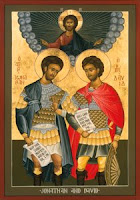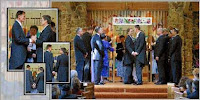
It is time to celebrate and acknowledge the uniquely spiritual same-sex relationships and devoutly queer individuals in the bible. I am amazed at how many Christians love to stone people different from them with their "deeply held religious beliefs" and selective Bible verses. It is all so negative, hurtful and unloving. Even to refute and counter their small minded beliefs is a negative exercise. Instead, I have pulled together the stories of a number of homosexual Biblical characters and several positive Biblical messages dealing with same-sex relationships. Let's call them "deeply held gay religious beliefs."
The Bible hosts numerous same-sex intimate relationships and holy unions. Such relationships were just as common then as now:
* The story of
David and Jonathan (
1 and 2 Samuel) is the best known relationship of several queer-friendly stories in the Bible. David, soon to be the 2nd king of Israel and writer of many of the
Psalms, was an accomplished warrior and slayer of Goliath. Jonathan was the eldest son of Saul, the first king of Israel. Their celebrated covenant/love story encompasses more chapters on the Bible than any other love story. This powerful and intimate story suggests that same-sex couples are affirmed and blessed by God. Christian genealogies list David as an ancestor of Jesus and his grandfather was the son of Naomi. When Jonathan is killed in battle, David laments, "Greatly beloved were you to me; your love for me was wonderful, passing the love of women."
*
Ruth and Naomi (
Ruth 1:13-18) is another. Ruth loved Naomi as Adam loved Eve. She pledged everything to be with her and take care of Naomi. Ruth's vow to Naomi has been used to exemplify the nature of the marriage bond. Throughout Christian history, her words are often read at weddings and used in sermons to explain the ideal love that spouses should have for one another. The fact that one woman to another originally spoke these words tells us a lot about how God feels about same-gender relationships.
*
Daniel and Ashpenaz (
Daniel 1:9) is a brief story that tells of the love between Ashpenaz, the chief of the court officials of the Babylonian King Nebuchadnezzar and the young prophet Daniel, the Prince of the Eunuchs. In the verse Ashpenaz showed "mercy and engaged in physical love" with Daniel. When reading about Daniel and Ashpenaz, it is important to remember that they were both eunuchs. Don’t assume that eunuchs couldn’t be gay. Men can retain their sexual drive if castration or physical damage occurs after puberty. The book tells of how Daniel and his young Judean companions (Shadrach, Meshach, and Abednego) were inducted into Babylon during Jewish exile. Daniel is known for his prophecies of great world empires, "the writing on the wall" and Daniel in the lions' den. No other romantic interest or sexual partner of Daniel is mentioned in the Bible.
* Two New Testament accounts relate the story of Jesus’ encounter with the gay
Roman centurion whose "pais" (beloved or same sex lover/servant) is sick at home in bed (
Matthew 8:5-13, Luke 7:2-10). This scripture reveals the day Jesus met and blessed a gay man. The centurion's relationship has a vivid gay subtext that Jesus would have known about, and yet accepts the bond between the two men without comment and heals the
pais-same sex lover. This is one of many stories where Jesus looked beyond the conventional moral response. This and other stances would prove deeply troubling to the religious and social authorities of the time.
* Lydia of Thyatira (Acts 16), the independent,
Gentile businesswoman, seller of purple cloth (a rare, expensive product) and
the first European Christian was most likely a lesbian. A liberated woman,
autonomous from male control, was unheard of at the time. There is no mention
of a husband, children, or being widowed. Lydia is noted to have led a women's
collective to whom Paul preached. She supports Paul on his missionary journey and
Paul baptizes her and her household.
* Saint Paul the Apostle, founder of Christianity as a world religion distinct from Judaism and writer of many of
the epistles in the New Testament (Romans, 1 & 2 Corinthians, Galatians,
Philippians, 1 Thessalonians, Philemon, Ephesians, Colossians, 2 Thessalonians,
1 & 2 Timothy, and Titus), lived a lifestyle that brings his sexuality into
question. Many scholars have suggested that Paul himself was a homosexual. He was torn by multiple conflicts. He wrestled with what he desired intellectually
versus the desire of his body or as he called it, a “thorn” in his flesh. Paul
pushed himself and his followers to a legalistic religion of control. He lashed
out when that system was threatened. He had a pejorative attitude toward women.
He rejected marriage as an outlet for his passion and had no sympathy for
heterosexuals who couldn't control their sexual desires. Meanwhile, his stormy
relational life was focused on men, such as Timothy, Barnabas and Silas. Today,
Paul would be viewed as exhibiting the traits of a conflicted, closeted
homosexual.
* There
has always been speculation about the sexuality of Jesus of Nazareth. Did he or didn’t he experience the full range of
human emotions and feelings associated with sexuality? And if he did, were both
women and men part of the experience? Sexual activity of Jesus and the
disciples is not given any overt attention in the gospels. Any conclusions on that subject are pure
speculation. Nevertheless, Jesus was very comfortable sharing intimate
affection and friendship with members of his own sex.
Two men were especially
close to Him.
* The
first was Lazarus (John 11), a bachelor
brother living with two spinster sisters. Lazarus was referred to by Jesus'
friends, when speaking to Jesus, simply as "the man you love," He was
so dear that Jesus would weep openly at his tomb and perform, for him, his most
astounding miracle, raising him from the dead in the very shadow of Jerusalem
and provoking the fatal wrath of the religious authorities.
* Apostle John, the beloved companion of
Jesus was one of the twelve apostles and the author of the Gospels of John and
the book of Revelation. John was
originally a fisherman and a disciple of John the Baptist. He later became a
disciple of Jesus and was the only one that remained with Jesus at the
cross of Calvary. He is among the
"inner three" who were with Jesus on special occasions: the
Transfiguration, the Garden of Gethsemane, and the preparations for the Last
Supper. John never married unlike the other disciples. In his gospel John never
refers to himself by name. He describes
himself on five occasions as "the one whom Jesus loved." John
continually draws the reader's attention to this special affection and fondness
that Jesus exhibited toward him. In the
account of the Last Supper he is depicted reclining next to Jesus, with his
head near or on Jesus' "bosom."
Throughout the
centuries, theologians have discussed the obvious relationship between the
disciple John and Jesus. It is not a modern interpretation. For example:
-- Aelred of Rievaulx, a 12-century English writer and Saint, in his
work Spiritual Friendship (1160), referred to the relationship of Jesus and
John as a "marriage" and held it out as an example sanctioning
friendships between clerics.
-- James I of England (1566-1625), who sponsored and authorized a new
translation of the Bible into English (KJV Bible), defended his close
relationship with the young Duke of Buckingham by saying: "I wish to speak
in my own behalf and not to have it thought to be a defect, for Jesus Christ
did the same, and therefore I cannot be blamed. Christ had his son John, and I
have my George.”
-- Others who have
given voice to this interpretation of the relationship between Jesus and John
were two Age of Enlightenment (18th century) thinkers: French philosopher Denis Diderot and English philosopher Jeremy Bentham.
-- In 2005, US Episcopal Bishop Gene Robinson
discussed the possible homoerotic inclinations of Jesus in a sermon. "Interestingly enough, in this day of traditional family values, this man that we follow was single, as far as we know, travelled with a bunch of men, had a disciple who was known as 'the one whom Jesus loved' and said my family is not my mother and father, my family is those who do the will of God."
These stories speak from the Bible to our changing world today! God has
included positive stories about gays.
David’s and Jonathan’s holy union covenant contained four identifiable components of marriage: the bonding of two souls in love, the familial aspect of their relationship, a mutual exchange of obligations and covenant oaths between David and Jonathan. David and Jonathan were bound to each other by their love. Jonathan’s soul was “knit” to David’s soul.
David and Jonathan lived in a culture that accepted their relationship without a second thought. They conducted their relationship openly. Their story played a prominent part in the narrative of
1 and 2 Samuel. This prominence is further evidence regarding social and cultural acceptance at the time the story was told and written. The biblical validation of their holy union is that David "was prospering [acting wisely] in all his ways for the Lord was with him," and that their covenant was made, "before the Lord." If God viewed their relationship poorly, these pieces of textual evidence simply would not exist. Through their story and others, God affirms and sanctifies same-sex, same-gender holy unions.

The apostle Paul says, "Test all things and hold fast to that which is good." Paul reminds Christians that they are under a new law: the law of Jesus, a law of love that requires us to do more than just avoid murder, adultery, lying, cheating, and stealing. Paul tells us what God wants is not strict adherence to a list of laws, but a pure heart, a good conscience, and a faith that is genuine.
Paul teaches that through Baptism all relationships have, in a sense, become “same-sex” relationships, because “there is no longer … male and female” (
Galatians 3:28). Same-sex marriages symbolize this more directly than heterosexual marriages, though both can symbolize it in their own ways.
Paul also insists that “the one who loves another has fulfilled the law” (
Romans 13:8), that “nothing is unclean in itself” as long as we don’t regard it as unclean (
Romans 14:14). That’s why Christians no longer worry about whether it’s OK to breed mules or wear a mixed-fiber shirt. That’s why most Christians allow eating rare steak too, even though the practice is condemned in both the Old and New Testaments and in early canon law. There doesn’t seem to be any good reason not to apply the same insight to same-sex marriages.

Christian weddings have already allowed a Christian definition of love in Christ’s gender-transcending body to redefine marriage. Marriage is no longer a transfer of ownership from one male to another. It’s now become primarily a prayerful, permanent, life-welcoming, mutual, self-giving, physically intimate commitment between two people. Same-sex marriage simply carries this insight to a very fitting conclusion.
Thousands of years ago, David and Jonathan joined with each other in a holy union that was affirmed and validated by God. The time has now come for our state and federal governments to follow God's lead and legally recognize the validity and sanctity of our relationships.
Thanks to the following writers for their above inspirational words: Christopher Hubble and Rev. Dr. Charles W. Allen.


















